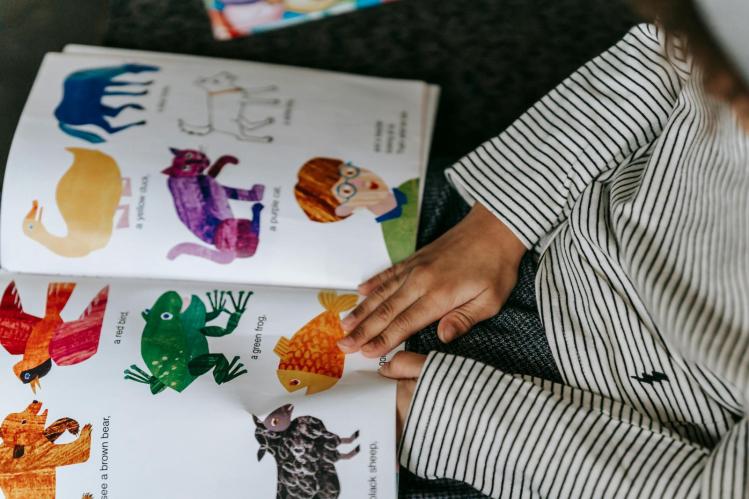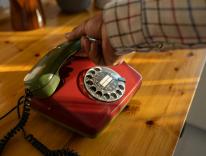
T
he week before I gave birth to my son, I went to the library and checked out some novels. This was one of the last tasks on my list. I’d stored up diapers and blankets, hung paintings on the walls of his nursery. I’d packed my hospital bag with chapstick, toothpaste, and pajamas. And now, I had my books. I didn’t know who I would be in the days after he was born. But I assumed I’d still want to read.
Having a newborn meant noise, mess, and visitors. My love for my son was so intense it often expressed itself as panic. But those early weeks also created stillness, separate from the world of obligation. While other people were working, going out, or sleeping, I read with my baby.
I read East of Eden in the living room, the baby sprawled asleep on my lap. When I got an infection and nursing became painful—an understatement—I read The Ninth Hour and The Topeka School and Our Man in Havana, stories from Brooklyn and Kansas and Cuba to take my mind away from my body. When I couldn’t sleep, I read works by Julian Barnes, Christian Wiman, and Jamel Brinkley. I read standing up in the nursery, the baby strapped to my chest, swaying and pacing to keep him asleep, eating forkfuls of reheated dinner as my free hand turned the pages.
As the weeks passed, my son began to read, too. At least, that’s what it looked like. He stared intently at the pages of various Curious George adventures and Jamberry. He read One Fish, Two Fish, Red Fish, Blue Fish, a fugue state of pink-ink-drinking Ginks and Zans opening cans; Frederick, the radical tale of a mouse who writes poems instead of helping his family lay in food for the winter, a veritable artist’s manifesto; and Chicka Chicka Boom Boom, an avant-garde dreamscape of colored letters climbing a coconut tree. Every night, we ended with Goodnight Moon. I watched my son flick his eyes from page to page, taking in color, shape, the pair of mittens and the bowlful of mush.
This was ridiculous. He couldn’t really be reading. I was doing that annoying thing parents do, trying to shape a child in my own image.
But I couldn’t bring myself to feel guilty. Teaching my son to love reading felt different than trying to train him up for the sake of my own ego. It was more akin to giving him a set of ethics, a particular vision of reality. Language was powerful, I wanted to insist, even from these very first days of Little Hoot and But Not the Hippopotamus. Language could change things; it was a gift. The world was full of stories and ideas that would shape his imagination, foster his empathy, provoke his delight, win his allegiance—stories and ideas he’d done nothing to earn, but inherited simply by virtue of being human. I watched his mouth make shapes, newly pairing consonants and vowels. He said “wah” and “gee” and “ho” as he studied the slashes and curves on the pages. He was learning to make meaning, learning that it cohered in tales and fables, parables and poems.
Plus: reading was fun! Books were cheap and portable. The same old volumes would always surprise you, revealing something new with each encounter. I felt that way returning to the stories of my childhood, suddenly getting the jokes in Winnie the Pooh and understanding the elegance of The Very Busy Spider.
The books of my adulthood were different, too, now that I was a mother. My son’s birth coincided (not entirely accidentally) with my rereading of Marilynne Robinson’s Gilead quartet. In this multigenerational Midwest story, I found myself—not so much in the particulars, but in the “big questions” underneath them. The “big questions,” especially “What are we doing here?” and “What comes next?,” are impossible to ignore when you have a baby. Books were one of the ways I could engage with them, at least in the interval before the baby woke up and needed a diaper change.
Was every novel in the world about children? It suddenly felt that way as I read through my haul from the library, and then the next, as the weeks of my son’s life turned into months, as I started sleeping more and eating at the table and nursing, at last, stopped hurting. It was uncanny how many babies and toddlers and teenagers and adults with parents of their own appeared in these books, crucial to the plots and themes. I hadn’t noticed them before.
At the very least, every novel was about time and its passage. And about the suffering we inevitably experience, the love that inevitably prevails, the great generosity undergirding it all. These were more legible to me now, watching my baby. One day they’d be legible to him, too. For now, he slept. The pile of picture books sat next to the rocking chair, waiting for our next new day.
Please email comments to [email protected] and join the conversation on our Facebook page.
Previous Story
Letters | The Cuban embargo, aid to Israel, and meaning in Catholic media
Next Story
Women at the Altar

